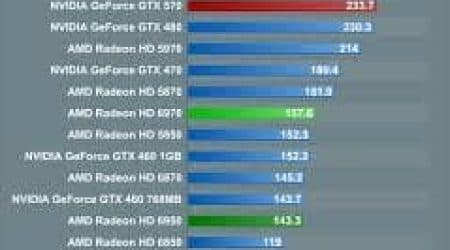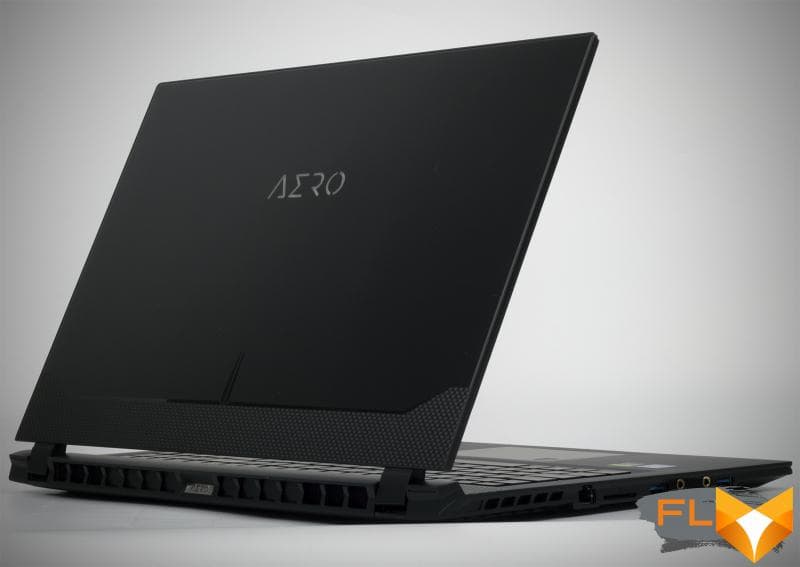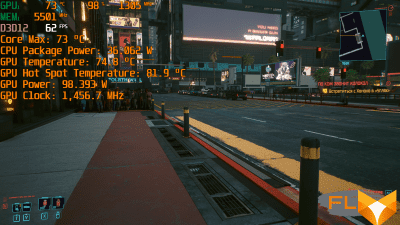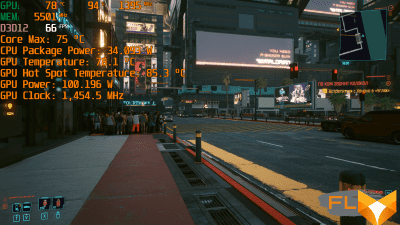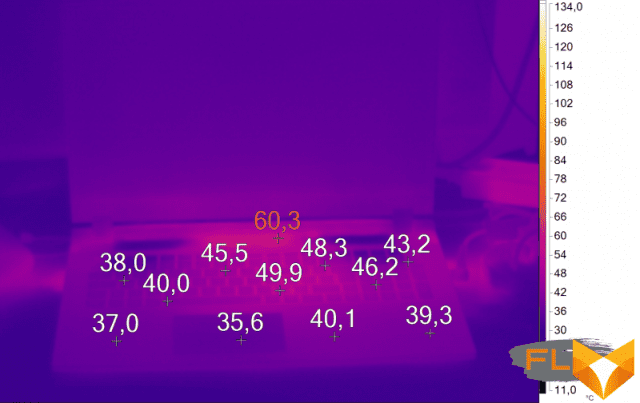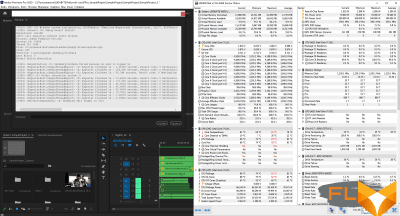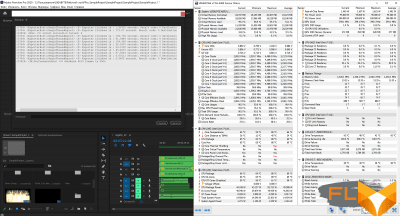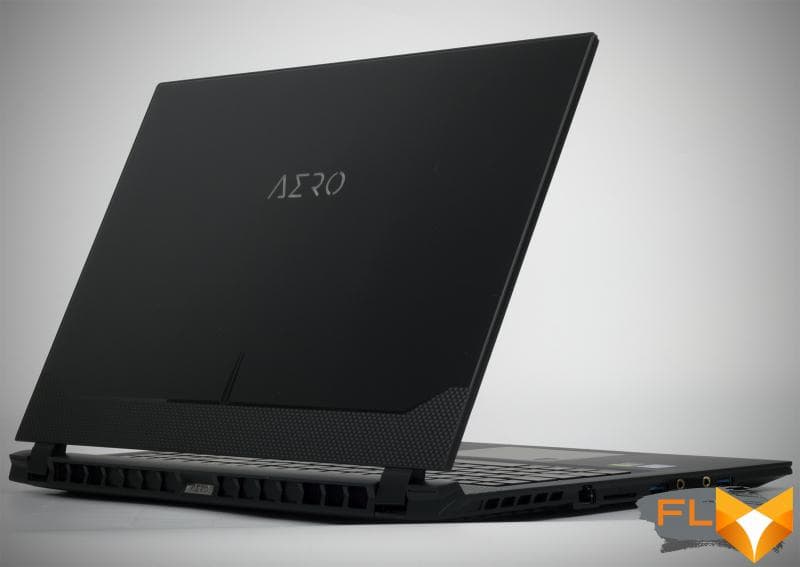


GIGABYTE, known in our country primarily for its motherboards and video cards, is also firmly established in the laptop market. This year we already introduced you to the AERO 15 OLED XC and AORUS 15G KC models, and now the 17-inch version of the AERO 17 HDR XD has arrived, addressed, according to the manufacturer, primarily to digital media content creators. At the heart of this mobile PC is an 8-core Intel Tiger Lake processor and GeForce RTX 3070 graphics. Let’s take a closer look at the new GIGABYTE.
GIGABYTE AERO 17 HDR XD
⇡#Specifications, equipment and software
On sale, you will find two versions of AERO 17 HDR when it comes to the 11th generation Intel platform. The XD version is equipped with GeForce RTX 3070 graphics, and the YD version is equipped with GeForce RTX 3080 graphics. In both cases, the GPU runs at a maximum power of 105W. But the rest of the characteristics are the same, paired with graphics in any case, the 8-core Core i7-11800H works. Other specifications of GIGABYTE AERO 17 HDR are shown in the table below.
| GIGABYTE AERO 17 HDR | |
|---|---|
| Main Display | 17.3″, 3840 × 2160, IPS |
| CPU | Intel Core i7-11800H |
| Video card | NVIDIA GeForce RTX 3080 8GB/16GB (105W with Dynamic Boost) NVIDIA GeForce RTX 3070 (105W with Dynamic Boost) |
| RAM | Up to 64GB DDR4-3200 |
| Install Drives | 1 × M.2 in PCI Express x4 3.0 / SATA 6Gb/s mode 1 × M.2 in PCI Express x4 4.0 mode |
| Interfaces | 3 × USB 3.2 Gen1 Type-A 1 x Thunderbolt 4 2 × 3.5 mm mini-jack 1 x HDMI 1 × mini-DisplayPort 1 x RJ-45 1 × UHS-II SD |
| Built-in battery | 99 Wh |
| External power supply | 230W |
| Dimensions | 396 × 270 × 21 mm |
| Laptop weight | 2.5kg |
| Operating system | Windows 10 Home Windows 10 Pro |
| Warranty | 2 years |
| Price | $3900 for test model |
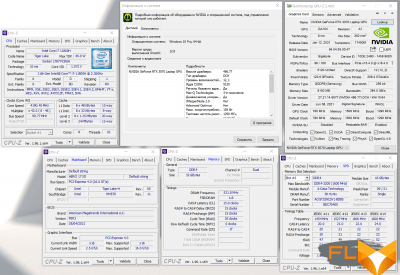 | 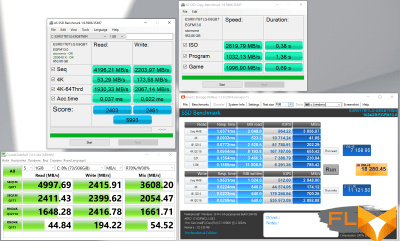 |
The XD version came to our office with a pre-installed 1 TB SSD and 32 GB of DDR4-3200 RAM, marking – XD-73RU544SP. In retail, such a laptop costs an average of $3,900.
In addition to all of the above, the laptop has an Intel AX200 wireless module that supports IEEE 802.11b/g/n/ac/ax standards, as well as Bluetooth 5.2. A 2.5-gigabit Realtek Gaming controller is responsible for the wired connection to the network.
The laptop comes with an external power supply with a power of 230 W and a weight of 800 grams, along with all the wires. The laptop does not support Power Delivery technology.
⇡#Appearance and Input Devices
The computer looks very strict – and this AERO 17 HDR XD only attracts our attention. A simple pattern is applied to the display cover, the side faces also have a profile shape. The inscription “AERO” is highlighted in white.
The body of the device is made of aluminum, but the manufacturer notes the use of a nano-carbon coating. The area with the keyboard turned out to be generally non-marking.
 | 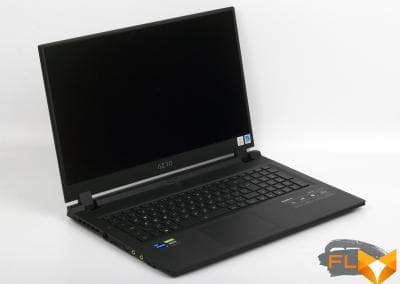 |
For a 17-inch model, the AERO 17 HDR XD is quite compact and not too heavy – however, such characteristics will not be called a curiosity in 2021. The laptop lid can be easily opened with one hand, the design uses tight and obviously high-quality hinges.
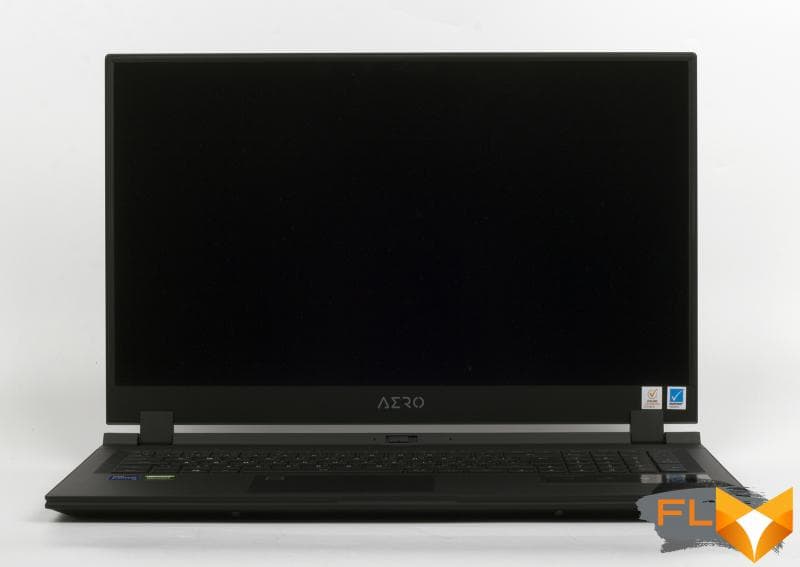
The manufacturer claims that the AERO 17 HDR XD received the world’s first 3 mm thick display with a thin bezel around the edges. The result is an 89% screen-to-body ratio that makes a laptop appear smaller than it actually is. This is especially evident from the reaction of people who encounter such laptops for the first time – they simply do not believe that they have a “seed” in front of them, and not a 15-inch version of a mobile PC.
The thickness of the AERO 17 HDR XD is 21.5mm.



The laptop was released for the so-called creators, and therefore its functionality must fully comply with the unspoken modern standards. There is a slot for UHS-II SD cards – and rightly so! And on the left side are RJ-45, a pair of USB 3.2 Gen1 A-type, as well as two 3.5 mm jacks (microphone in and headphone out). On the right, there’s another USB 3.2 Gen1 A-type, Thunderbolt 4 with up to 40 Gbps of bandwidth, and HDMI 2.1 video outputs with mini-DisplayPort.
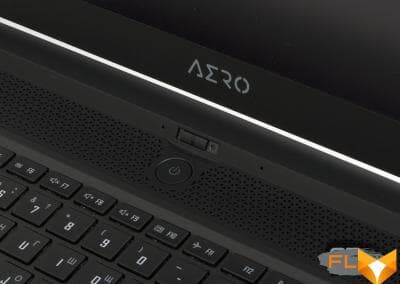 | 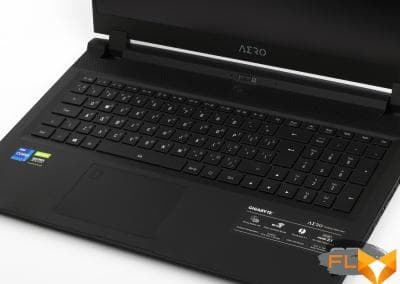 |
The keyboard of the 17-inch laptop is expectedly equipped with a numeric keypad. It is no different from what we saw in the previously tested AORUS 15G KC model. I would like to get larger left Ctrl and Shift, but you get used to such buttons in a day or two. The arrow keys are not highlighted in any way. Finally, Insert and Print Screen only work in combination with a function key.
The keyboard has RGB backlighting, which can be customized in the GIGABYTE Control Center app. The illumination of the buttons has not changed: only English letters, numbers and symbols are highlighted, so in the dark you have to type in Russian from memory – for some users this can be a serious problem. However, the manufacturer’s representatives assured us that in future modifications of laptops intended for sale in the Russian Federation, the illumination of Cyrillic characters will be implemented and, moreover, such modifications are already in production. The keyboard supports N-Key Rollover technology, which allows you to press up to 80 buttons simultaneously. The key travel is approximately 2 mm, pressing is well felt, although it is almost silent. It also supports the creation of macros involving any keys.
The touchpad is not very large (106 × 71 mm) and has a fingerprint scanner. I have no complaints at all about his work: the touch panel is responsive, it works clearly.
We previously praised the AERO 17 HDR XD for its thin display lid bezels. This was achieved, among other things, by moving the webcam from the top edge of the cover to the main part of the laptop body – the optics are located directly above the power button, plus it is equipped with a movable shutter. However, there is nothing to say about the camera itself: the laptop uses a standard HD sensor.
⇡#Internal design and upgrade options
The bottom cover of the AERO 17 HDR XD is very easy to remove, but be aware that you will have to remove a few Torx screws.
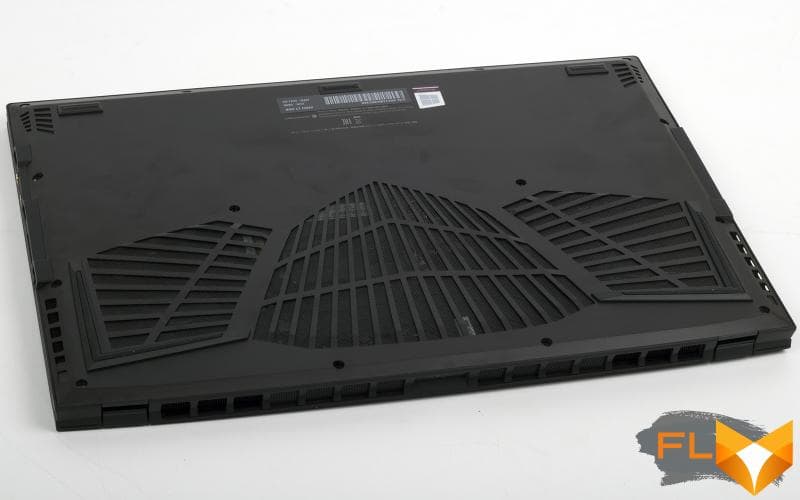
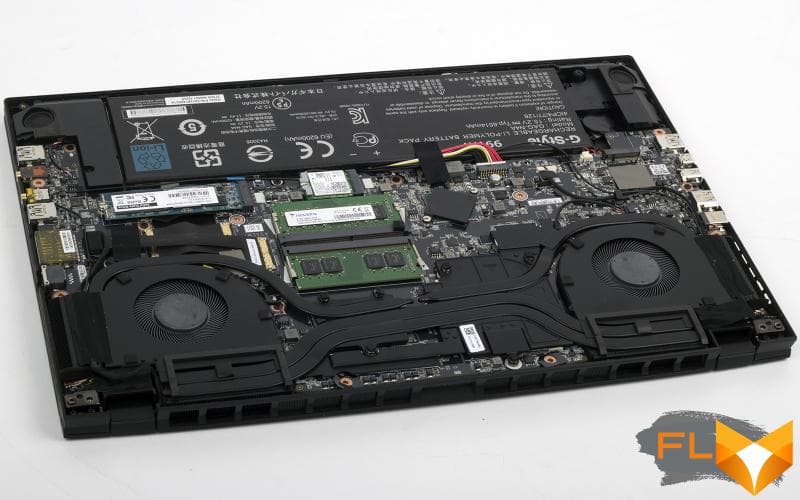
Coolers powerful laptops GIGABYTE called WindForce Infinity. We are dealing with a rather impressive system, which has five copper heat pipes, two fans and four large copper heatsinks. Heated air is ejected by “carlsons” in four directions, and a new portion of cold air enters through a rather large perforated grill on the bottom.
Each WindForce Infinity fan received 71 blades. According to GIGABYTE, the heat dissipation efficiency is increased by 30% compared to the previous generation model.
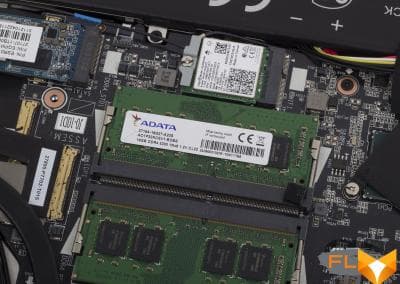 | 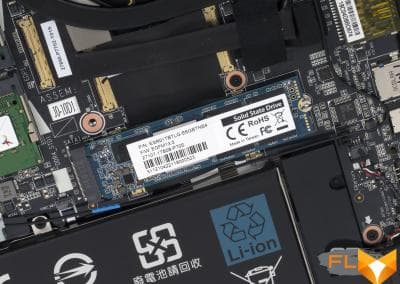 |
The laptop is equipped with two M.2 slots: one has four PCI Express 4.0 lines, and the other has the same number, but the 3.0 standard. A terabyte drive ESR01TBTLG-E6GBTNB4 is installed in one of the connectors – apparently, we are dealing with an OEM SSD from Phison Electronics. But both SO-DIMM slots are equipped with 16 GB DDR4-3200 modules manufactured by ADATA.
⇡#Test Methodology
The testing methodology for gaming laptops puts even more emphasis on PC gaming. Laptop performance was measured using various software.
Games (Full HD, WQHD and Ultra HD resolution):
- World of Tanks EnCore RT. DirectX 11. Benchmark. Ultra mode, RT off
- Counter Strike: Global Offensive. DirectX 9. FPS Benchmark map. Multi-core processing – incl. Maximum quality.
- The Witcher III: Wild Hunt. DirectX 11. Novigrad and surroundings. Maximum quality.
- GTA V. DirectX 11. Built-in benchmark. Maximum quality, FXAA + 2x MSAA, advanced quality settings – on, 16x AF, image resolution scaling – off. In 4K – no AA.
- PlayerUnknown’s Battlegrounds. DirectX 11. Training mode. Ultra Mode
- Shadow of the Tomb Raider. DirectX 12. Built-in benchmark. Maximum quality, DXR – off, TAA.
- Assassin’s Creed Valhalla. DirectX 12. Built-in benchmark. Highest mode.
- Battlefield V. DirectX 12. The Last Tiger mission. Ultra Mode, TAA, DXR Off
- Red Dead Redemption 2. Vulkan. Built-in benchmark. Maximum quality (advanced settings – off), TAA.
- Gears 5. DirectX 12. Built-in benchmark. Ultra Mode
- Metro: Exodus. DirectX 12. Built-in benchmark. Ultra Mode
- Horizon Zero Dawn. DirectX 12. Built-in benchmark. Top quality, TAA.
- Death Stranding. DirectX 12 Prologue. Maximum quality.
- A Total War Saga: TROY. DirectX 11. Built-in benchmark. Max mode, 4x AA. In 4K – no AA.
- DOOM Eternal. Vulcan. Beginning of the game. Absolute Nightmare Mode
- Watch Dogs: Legion. DirectX 12. Built-in benchmark. Maximum quality, TAA, DXR off, DLSS off
- Cyberpunk 2077. DirectX 12. City trip. Impressive quality mode, DXR off, DLSS off
Gaming performance was measured using the well-known CapFrameX program. It allows you to get the rendering time of each frame. The use of the 99th percentile instead of the minimum frames per second is due to the desire to clean up the results from random performance fluctuations that were provoked by reasons not directly related to the operation of the main components of the platform.
Testing the laptop in games and applications was carried out with the activation of the fastest mode suitable for these tasks.
Applications:
- Corona 1.3. Testing rendering speed using the renderer of the same name. Measures the build speed of the standard BTR scene used to measure performance.
- Blender 2.92. Determination of the final rendering speed in one of the popular free packages for creating three-dimensional graphics. The duration of building the final model pavillon_barcelona_v1.2 from Blender Benchmark is measured.
- x265 HD Benchmark. Testing the speed of video transcoding to H.265/HEVC format. The tables and graphs show the average integer value obtained after five runs of the test.
- CINEBENCH R23. Measuring the performance of photorealistic 3D rendering in the CINEMA 4D animation package, CPU test. The tables and graphs show the average integer value obtained after five runs of the test.
- Adobe Premiere Pro 2020 – Rendering a project in 4K resolution.
- Topaz Video Enhance AI v1.2.3. Performance testing in an AI-based program to improve video detail. The test uses the original video at 1280×720 resolution, which is scaled up by 150% using the Artemis-HQ model: P, HQ, MC.
Comprehensive benchmarks:
- Futuremark PCMARK10 Professional Edition 2.1.2177. Testing in Essentials scenarios (typical work of an average user: launching applications, surfing the Internet, video conferencing), Productivity (office work with a text editor and spreadsheets), Digital Content Creation (creation of digital content: photo editing, non-linear video editing, 3D rendering and visualization -models).
- 3DMark Professional Edition 2.11.6846. Testing in Time Spy and Fire Strike scenes.
- Unigine Superposition Benchmark. 1080p Extreme testing.
Notebook testing in resource-intensive applications was carried out in the default mode without any adjustment of the parameters of the central processor and cooler.
Display testing is performed using the X-Rite i1Display Pro colorimeter and the DisplayCAL 3 application.
The battery life of the laptop was tested in two modes. The first load option – web surfing – involves alternately opening and closing the tabs of the Computeruniverse.ru and Unsplash.com sites with an interval of 30 seconds. For this test, the current version of the Google Chrome browser at the time of testing is used. In the second mode, video in .mkv format and Full HD resolution is played in the built-in player of Windows OS with the repeat function activated. In all cases, the same display brightness was set to 200 cd / m2, and the keyboard backlight (if any) and the sound were turned off.
In games and other applications, the results of the following laptops are considered:
| Test participants | ||||||
| Model | Screen | Processor | RAM | Graphics | Drive | Battery |
| MSI GE66 Raider (2021) | 15.6”, 1920 × 1080 | Intel Core i7-10870H, 8/16 cores/threads, 2.2 (5.0) GHz, 45W | 16 GB DDR4-3200 Dual Channel | NVIDIA GeForce RTX 3070 Notebook 8GB GDDR6 | SSD 512 GB | 99.9 Wh |
| ASUS Zephyrus G15 | 15.6”, 2560 × 1440 | AMD Ryzen 7 5800HS 8/16 cores/threads 2.8 (4.4) GHz 35W | 16 GB DDR4-3200 Dual Channel | NVIDIA GeForce RTX 3070 Notebook 8GB GDDR6 | SSD, 1TB | 90 Wh |
| GIGABYTE AORUS 15G KC | 15.6”, 1920 × 1080 | Intel Core i7-10870H, 8/16 cores/threads, 2.2 (5.0) GHz, 45W | 16 GB DDR4-3200 Dual Channel | NVIDIA GeForce RTX 3060 Notebook 6GB GDDR6 | SSD 512 GB | 99 Wh |
| ASUS ROG Zephyrus G14 GA401 (2021) | 14”, 2560 × 1440 | AMD Ryzen 9 5900HS 8/16 Cores/Threads 3 (4.6)GHz 35W | 32 GB DDR4-3200 Dual Channel | NVIDIA GeForce RTX 3060 Notebook 6GB GDDR6 | SSD, 1TB | 76 Wh |
| ASUS TUF Gaming F15 (FX506H) | 15.6”, 1920 × 1080 | Intel Core i7-11800H, 8/16 cores/threads, 2.3 (4.6) GHz, 45W | 32 GB DDR4-3200 Dual Channel | NVIDIA GeForce RTX 3050 Ti Notebook 4GB GDDR6 | SSD, 1TB | 48 Wh |
| ASUS ROG Zephyrus S17 GX703 | 17.3″, 3840 × 2160 | Intel Core i9-11900H, 8/16 cores/threads, 2.5 (4.9) GHz, 45W | 32 GB DDR4-3200 Dual Channel | NVIDIA GeForce RTX 3080 Notebook 16GB GDDR6 | SSD, 3TB | 90 Wh |
| GIGABYTE AERO 17 HDR XD | 17,3″, 3840 × 2160 | Intel Core i7-11800H, 8/16 cores/threads, 2.3 (4.6) GHz, 45 W | 32 GB DDR4-3200 Dual Channel | NVIDIA GeForce RTX 3070 Notebook 8GB GDDR6 | SSD, 1TB | 99 Wh |
⇡#Display and sound
The manufacturer’s website says that absolutely all displays installed on AERO series laptops undergo a mandatory calibration and certification procedure using the X-Rite Pantone professional device. The AERO 17 HDR XD is equipped with an AU Optronics B173ZAN03.2 IPS panel that supports 4K resolution and the VESA DisplayHDR 400 standard.
The test results clearly show that the screen in AERO 17 HDR XD is very good. The matrix has excellent indicators of brightness and contrast, as well as excellent color reproduction. Yes, the hero of the review is perfect for those who work professionally with digital content.
| GIGABYTE AERO 17 HDR XD (Matrix – AU Optronics B173ZAN03.2) | |
| Minimum brightness | 3 cd/m2 |
| Maximum brightness | 464 cd/m2 |
| Color temperature | 6600 K |
| Contrast | 1412:1 |
| sRGB gamut | 100% |
| Adobe RGB color gamut | 100% |
| Grey scale deviation: average (maximum) | 0.71 (1.54) |
| Extended test deviation: mean (maximum) | 0.51 (1.82) |
| Viewing angles | correspond to the declared |
| Glow effect | present |
| PWM | not seen at all brightness levels |
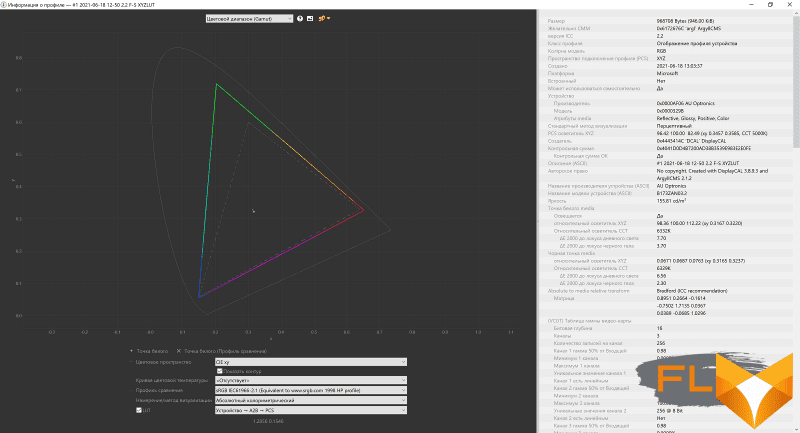
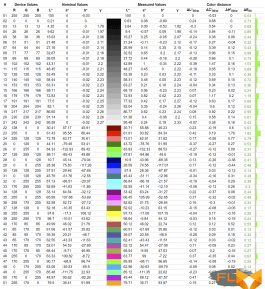 | 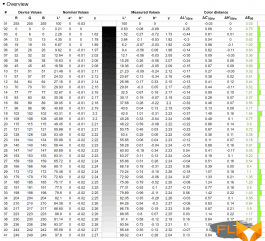 | 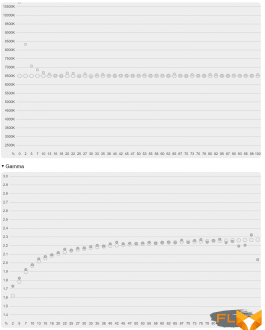 |
The sound quality of the AERO 17 HDR XD pleased us: the volume margin is excellent, the bass is there, the musical compositions in general are reproduced quite clearly.
⇡#Efficiency of the cooling system
In the GIGABYTE Control Center program, we can choose one of four laptop operating modes: Creator, Turbo, Gaming and Maximum Battery Life. It was decided to test AERO 17 HDR XD in Turbo and Game modes.
| Summary of laptop operation and setup | ||
| Laptop mode | Turbo | Gaming |
| Declared GPU Speed (Boost) and Memory Speed | 1290 MHz, 12 Gbps | 1290 MHz, 12 Gbps |
| Cyberpunk 2077 Real GPU Clock: Min, Max, Average | 1305 MHz | 1305 MHz |
| 1590 MHz | 1570 MHz | |
| 1457 MHz | 1455 MHz | |
| Maximum noise level | 50.7 dBA | 43.8 dBA |
| Average Power: GPU, CPU | 99W | 100W |
| 36 W | 34 W | |
| GPU Temperature: Average, Maximum | 75 °C | 78 °C |
| 76 °C | 79 °C | |
| CPU temperature: average, maximum | 73 °C | 76 °C |
| 84 °C | 84 °C | |
| Performance | ||
| 3DMark Time Spy scores | 9038 | 9025 |
| 3DMark Fire Strike scores | 20673 | 20628 |
| Unigine Superposition, 1080p Extreme, points | 6009 | 5942 |
| Turbo | Gaming |
Notebook case heating (games, nominal operation)
In the first case, the power limit of 70 W is activated for the central processor (instead of the standard 45 W), but the cooler fans rotate at 100% even without load. In Gaming Mode, the laptop runs silently without load, but there is no overclocking of the GPU, and therefore, in both cases, the mobile PC shows similar results in benchmarks.
We see that in gaming mode, the laptop under load is quite noisy – you can’t call a quiet device in games. Nevertheless, with these parameters, the cooling system copes well with the Core i7-11800H and the GeForce RTX 3070, the chip of which is limited in power consumption to 105 watts. In the “Turbo” mode, the temperatures are even lower, but the noise level also increases noticeably.
The laptop case gets quite hot in the middle part, closer to the power button. Fortunately, the keyboard heats up on the sides, let’s say, within standard limits – it doesn’t interfere with playing.
Below is a clear illustration of the fact that the Core i7-11800H with a power limit of 70 and 45 W are practically two different processors. In the same Adobe Premiere Pro, turning on the Turbo mode made AERO 17 HDR XD 10% faster. But in the Gaming mode, the laptop (without the load on the video card) is very quiet, since the cooler with heat pipes common to the GPU and CPU can easily cope with a 45-watt crystal.
It is worth noting that in the GIGABYTE Control Center you can even create your own mode of operation of the laptop cooler – so that it makes less noise, but at the same time functions more efficiently.
| Laptop cooling performance in Adobe Premiere Pro 2020 | |||
| Turbo | Gaming | ||
| CPU frequency | Medium | 3.8 GHz | 3.2 GHz |
| CPU temperature | Maximum | 93 °C | 88 °C |
| Medium | 83 °C | 69 °C | |
| Noise level | Maximum | 50.9 dBA | 37.9 dBA |
| CPU power consumption | Average | 71 W | 46 W |
| Test task execution time (less is better) | 721 s | 800 s | |
| Turbo | Gaming |
⇡#Notebook Performance
The moment has come when we can say that we have already studied a decent number of laptops with GeForce RTX 3070 graphics. Therefore, we are well aware of the potential of this laptop GPU. The table below compares the AERO 17 HDR XD to other laptops using chips such as the GeForce RTX 3060 and GeForce RTX 3080. The laptop was tested in Turbo mode.
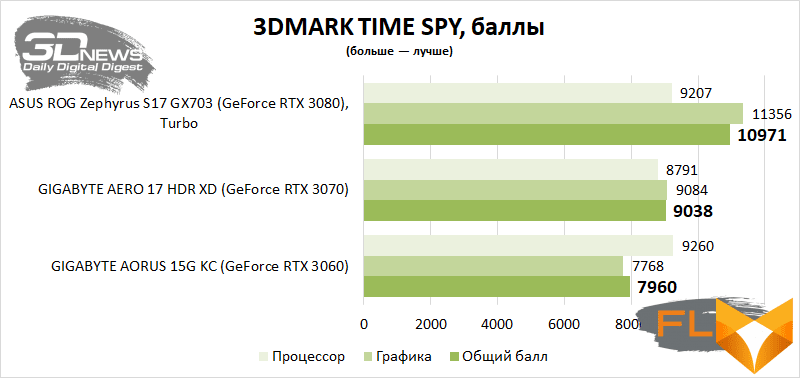
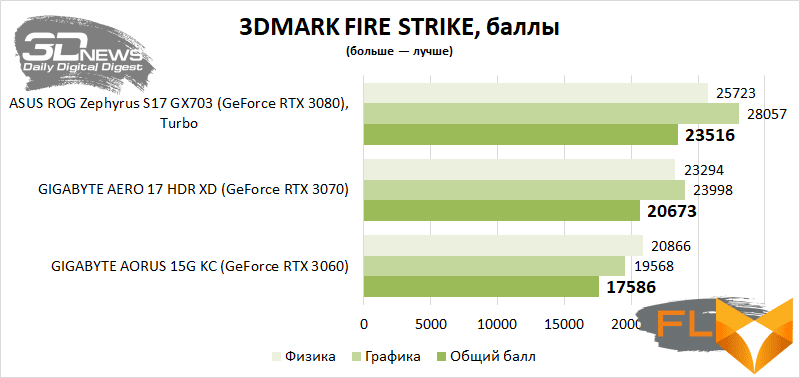
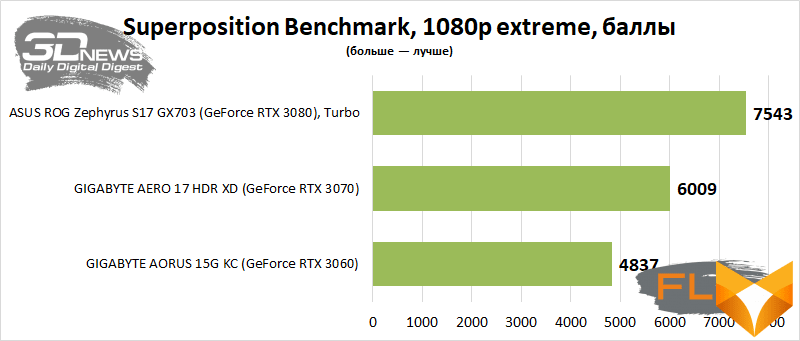
Of course, the hero of the review is great for games, because the AERO 17 HDR XD is equipped with the second fastest mobile GPU. True, in 4K resolution, the mobile GeForce RTX 3070 becomes difficult in 5 out of 17 cases – here you will either have to reduce the quality of the graphics or change the resolution. In the same WQHD, “Aero” produces a frame rate that does not drop below the conditionally comfortable mark of 30 frames per second in all games except “Cyberpunk”, where it is better to simply activate the DLSS function.
| Test results in games, FPS (more is better) | ||||||
| Full HD | WQHD | Ultra HD | ||||
| AVG | 1% MIN | AVG | 1% MIN | AVG | 1% MIN | |
| World of Tanks | 230 | 151 | 160 | 105 | 68 | 47 |
| CS:GO | 420 | 111 | 317 | 71 | 190 | 41 |
| PlayerUnknown’s Battlegrounds | 169 | 113 | 123 | 82 | 70 | 55 |
| The Witcher III: Wild Hunt | 102 | 65 | 78 | 50 | 47 | 32 |
| GTA V | 84 | 58 | 73 | 54 | 58 | 41 |
| Shadow of the Tomb Raider | 77 | 48 | 70 | 48 | 42 | 34 |
| Assassin’s Creed Valhalla | 63 | 44 | 51 | 36 | 33 | 24 |
| Red Dead Redemption 2 | 69 | 56 | 54 | 45 | 35 | 29 |
| Gears 5 | 95 | 65 | 74 | 54 | 41 | 33 |
| Metro: Exodus | 64 | 34 | 53 | 31 | 34 | 22 |
| Death Stranding | 87 | 68 | 84 | 68 | 56 | 45 |
| A Total War Saga: TROY | 80 | 64 | 57 | 45 | 47 | 39 |
| Horizon Zero Dawn | 68 | 46 | 65 | 44 | 43 | 33 |
| Watch Dogs: Legion | 69 | 46 | 55 | 37 | 30 | 26 |
| Battlefield V | 111 | 70 | 85 | 57 | 49 | 36 |
| Cyberpunk 2077 | 63 | 47 | 32 | 23 | 20 | 16 |
| DOOM Eternal | 199 | 141 | 155 | 112 | 56 | 45 |
We have already explored the potential of the new Tiger Lake chips – AERO 17 HDR XD did not become a pioneer for us. Graphs with test results are given below, and everyone will draw conclusions for himself.
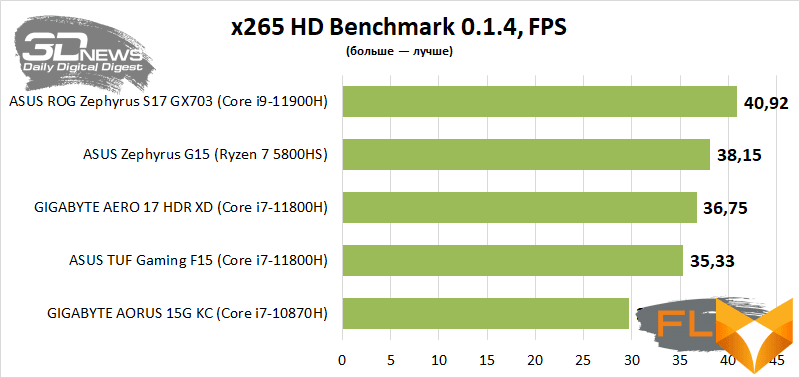
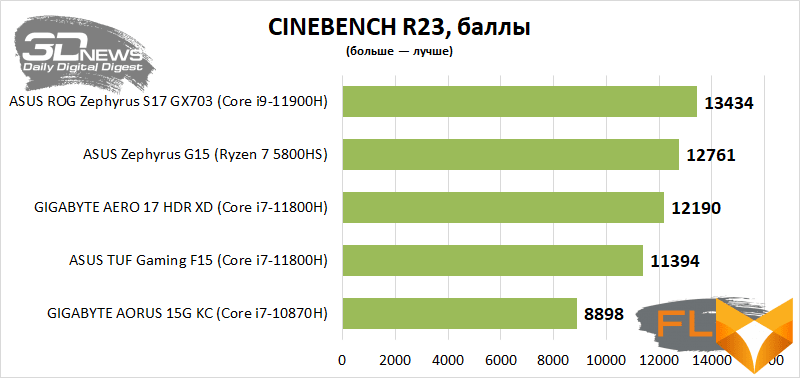
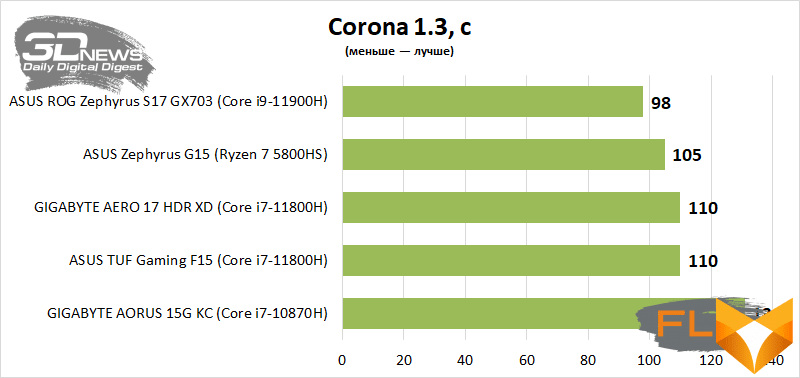
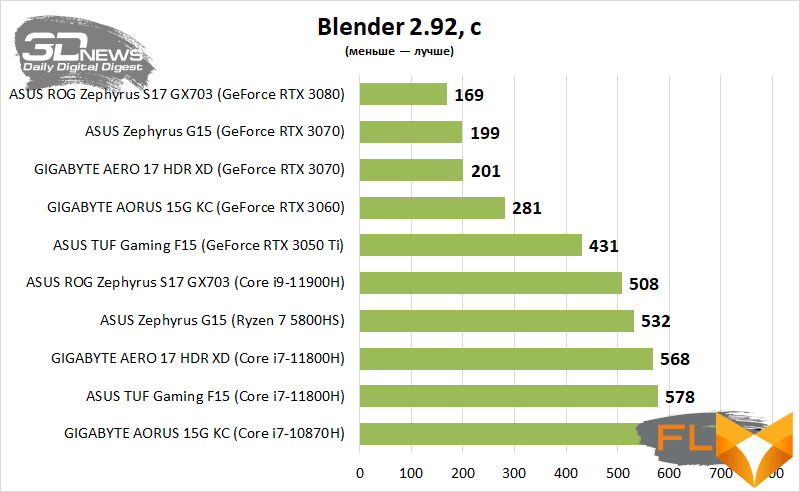
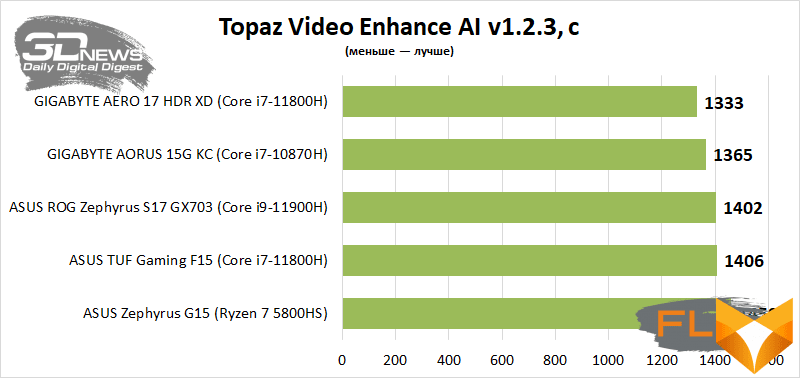
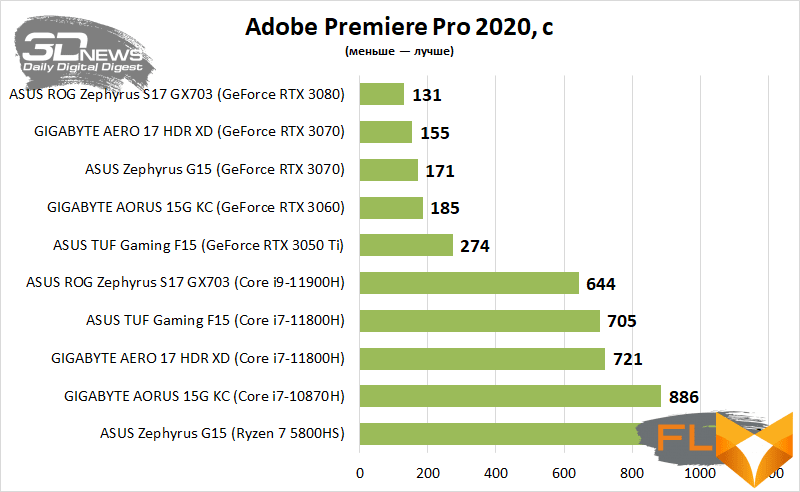
Below are the results of testing the laptop in the PCMARK10 comprehensive benchmark. In a number of tests (such as archiving, working with graphics and photo and video content, interacting with browsers, as well as with office applications), the laptop drive plays an important role. The GIGABYTE laptop comes with Phison Electronics ESR01TBTLG-E6GBTNB4, which supports the PCI Express 4.0 standard.
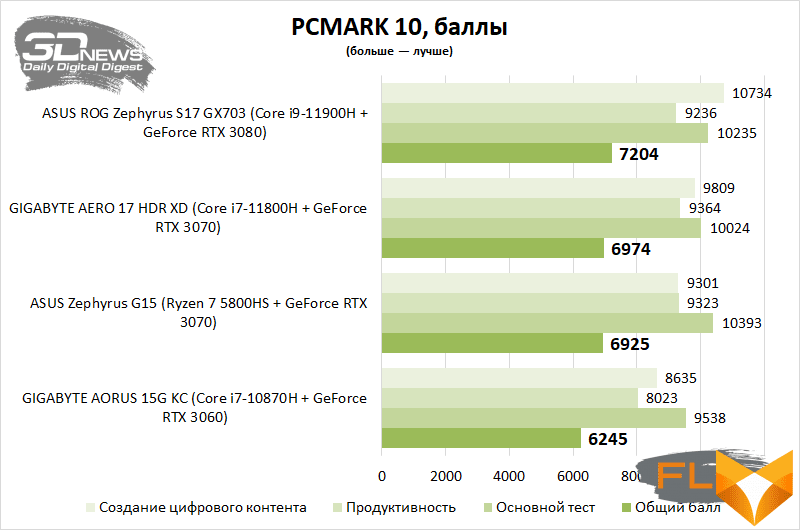
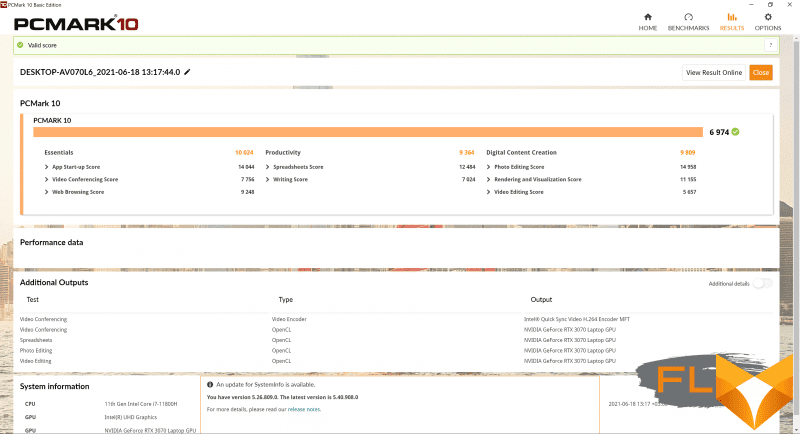
⇡#Laptop offline
The AERO 17 HDR XD versions come with a 99 Wh battery. The hardware in the laptop is powerful, plus a 4K display is installed. So even with such a battery, it is hard to expect a record-breaking autonomy from a computer, comparable, for example, with the performance of modern ultrabooks. But you can’t call it bad either: stable 6 hours were obtained with a fairly high display brightness.
| Battery life, screen brightness 200cd/m2 | |
| Web | 6 h 13 min |
| View video | 6 h 0 min |
⇡#Conclusions
First and foremost, the GIGABYTE AERO 17 HDR XD is a well-built laptop. The aluminum case, strict design, the presence of a card reader, modern video outputs and Thunderbolt 4 are a good set for a laptop designed for work. The display is magnificent, it is pleasant not only to work with it, but also to play. The cooling system copes with the declared hardware and, under load only on the processor, can perform its functions very quietly. In games, the AERO 17 HDR XD is noisy, but quite tolerable.
The shortcomings that we pointed out in the recently tested AORUS 15G also migrated to the hero of the review – this is the lack of USB 3.2 Gen2. Whether it is critical for you or not – decide for yourself, dear readers.
FAQ gigabyte aero 17 hdr xd laptop review
What are the key features of the Gigabyte Aero 17 HDR?
The Gigabyte Aero 17 HDR boasts a 4K HDR display, an Intel Core i7 or i9 processor, NVIDIA GeForce RTX 2070 or RTX 2080 graphics, and up to 1TB SSD storage, making it a powerful choice for both gaming and creative work.
How does the NVIDIA GeForce RTX 3070 Laptop GPU perform in the Aero 17 HDR?
The NVIDIA GeForce RTX 3070 Laptop GPU in the Aero 17 HDR provides excellent performance for gaming and creative tasks, offering advanced ray tracing capabilities and AI features for enhanced graphics.
Is the Gigabyte Aero 17 HDR a good choice for content creators?
Yes, the Gigabyte Aero 17 HDR, with its 4K HDR display and powerful NVIDIA RTX graphics, is an excellent choice for content creators who need high color accuracy and rendering performance.
What do customer reviews generally say about the Aero 17 HDR’s 4K HDR display?
Customer reviews of the Aero 17 HDR often praise its 4K HDR display for its vivid colors, sharp details, and excellent brightness, making it ideal for high-resolution gaming and professional image editing.
How does the RTX 2070 Super Max-Q in the Aero 17 compare to the RTX 2080 Super?
The RTX 2070 Super Max-Q in the Aero 17 offers slightly lower performance compared to the RTX 2080 Super, but it still delivers excellent gaming and graphics performance, especially in a slim laptop form factor.
What improvements does the Gigabyte Aero 17 HDR YD model have over last year’s Aero?
The Gigabyte Aero 17 HDR YD model features improvements like updated 10th Gen Intel Core processors, newer NVIDIA GeForce RTX graphics, and enhanced thermal management over last year’s Aero models.
What is the maximum RAM capacity of the Aero 17 HDR?
The maximum RAM capacity of the Aero 17 HDR laptop is 64GB, allowing for extensive multitasking and handling memory-intensive applications smoothly.
Can the Gigabyte Aero 17 HDR handle intensive CPU and GPU tasks?
Yes, with its Intel 10th Gen Core i7-10875H processor and NVIDIA GeForce RTX 2070 or 2080 graphics, the Aero 17 HDR can handle intensive CPU and GPU tasks, making it suitable for gaming, video editing, and 3D rendering.
What do reviews say about the Aero 17 HDR’s performance in both non-HDR and HDR modes?
Reviews of the Aero 17 HDR note that its display performs exceptionally well in both non-HDR and HDR modes, offering bright, vivid colors and deep contrast, suitable for both gaming and professional creative work.
How is the Aero 17 HDR YD’s display quality for creative professionals?
The Aero 17 HDR YD’s display is highly rated for creative professionals, as Gigabyte specifies that it offers excellent color accuracy and a wide color gamut, which are crucial for tasks like photo and video editing.
What are the standout features in the Aero 17 HDR review?
The Aero 17 HDR review highlights its 17-inch 4K HDR display, Intel Core processors, NVIDIA GeForce RTX 2070 Super graphics, and a chassis adorned with the Aero logo, making it a top choice for creators and gamers.
How does the Gigabyte Aero 17 HDR compare to the Blade Pro 17 as a creator laptop?
Compared to the Blade Pro 17, the Gigabyte Aero 17 HDR stands out with its superior 4K HDR display, making it more suitable for tasks requiring high color accuracy, which is essential for creative professionals.
What upgrades does Gigabyte’s Aero 17 HDR bring to the Aero laptop series?
Gigabyte’s Aero 17 HDR brings significant upgrades to the Aero laptop series, including enhanced 4K HDR displays, improved speaker quality, and more robust gaming performance with the GeForce RTX 2070 Super.
Is the Intel UHD graphics card included in the Aero 17 HDR sufficient for professional work?
While the Aero 17 HDR comes with an Intel UHD graphics card, its main graphical power lies in the dedicated GeForce RTX 2070 Super, which is more than capable of handling professional and creative work.
What do reviews on Laptop Mag say about the Aero 17 HDR’s performance?
Reviews on Laptop Mag generally praise the Aero 17 HDR for its outstanding display, powerful performance, and sleek design, positioning it as a premium gaming laptop that exceeds average expectations.
How much RAM and SSD storage does the Aero 17 HDR typically come with?
The Aero 17 HDR typically comes equipped with 16GB of RAM and a 1TB SSD, providing ample memory and fast storage for both gaming and creative tasks.
What are the general impressions of the Aero 17 HDR XB’s review unit?
The review unit of the Aero 17 HDR XB has received positive feedback for its crisp 4K HDR display, high-end gaming performance, and sleek, professional design, making it a highly sought-after laptop.
What kind of tasks can the Gigabyte Aero 17 handle effectively?
The Gigabyte Aero 17, with its powerful Intel Core processors and NVIDIA RTX graphics, can handle a wide range of tasks effectively, from intensive gaming to demanding creative work like video editing and 3D modeling.
How does the Aero 17 HDR’s speaker quality enhance the gaming and multimedia experience?
The Aero 17 HDR’s speakers provide clear and immersive audio quality, enhancing the gaming and multimedia experience, and making it a great choice for users who value good sound in their laptops.
What improvements in display technology does the Aero 17 HDR YD model offer?
The Aero 17 HDR YD model offers improvements in display technology with its 4K HDR YD display, providing enhanced brightness, color accuracy, and a wider color gamut, ideal for professional graphic work and high-end gaming.




